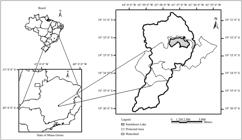Abstract
Despite being inside a protected area, Lake Sumidouro has been impacted by the anthropogenic occupation of the surrounding area since the 1970’s, compromising the ecological integrity of the lake and the sustainable use of natural resources. This study examined the current trophic classification of the lake and developed methods for improving it through an integrated analysis of morphometric and limnological parameters, land use and land occupation in the watershed, and eutrophication potential. Data for the limnological parameters, land use and land occupation, and morphometric characteristics of Lake Sumidouro were collected in the rainy and dry seasons of 2009 and 2010. Depending on the trophic classification system used, Lake Sumidouro is classified as oligotrophic to hypereutrophic. In our study, the highest concentration of nutrients occurred in the rainy season, indicating that high nutrient inputs played an important role during this period. Areas of anthropogenic occupation comprised approximately 62.9% of the total area of the watershed, with pasture and urban settlement as the main types of land use. The influent total phosphorus load was estimated to be 15,824.3 kg/year. To maintain mesotrophic conditions, this load must be reduced by 29.4%. By comparing the isolated use of trophic state indices, this study demonstrated that comparing the trophic state classification with morphometric analyses, land use and land occupation types in the watershed, and potential phosphorus load provided better information to guide management actions for restoration and conservation. Furthermore, this approach also allowed for evaluating the vulnerability of the environment to the eutrophication process.
Keywords:
water quality; trophic indices; phosphorus; restoration; conservation

 Thumbnail
Thumbnail
 Thumbnail
Thumbnail

